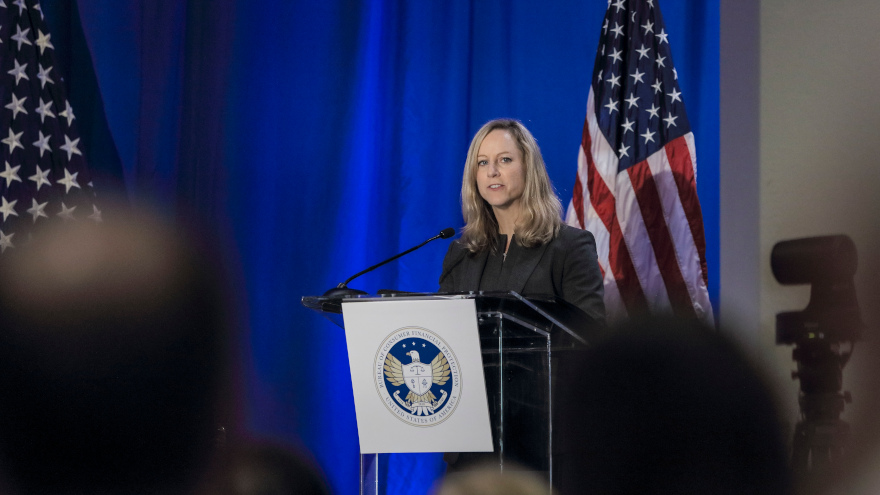Whistleblowers could land as much as $10M through new CFPB proposal

Consumer Financial Protection Bureau director Kathleen Kraninger. Photo by Bryce Spivey / CFPB
By subscribing, you agree to receive communications from Auto Remarketing and our partners in accordance with our Privacy Policy. We may share your information with select partners and sponsors who may contact you about their products and services. You may unsubscribe at any time.
WASHINGTON, D.C. –
The Consumer Financial Protection Bureau explained how it potentially could be quite monetarily worthwhile for someone to be a whistleblower.
In fact, it could be as much as $10 million worthwhile in funds from the company found guilty of infractions as it relates to fair-lending violations.
As a part of a three-part initiative connected to a “one of its key priorities,” the CFPB explained in its Whistleblower Award Incentive Legislative Proposal that one or more whistleblowers who voluntarily provided original information that leads to the successful enforcement of the covered administrative proceeding or court action in an aggregate amount equal to:
— Not less than 10%, in total, of what has been collected of the monetary sanctions imposed in the action
— Not more than 30%, in total, of what has been collected of the monetary sanctions imposed in the action
The maximum award to any single whistleblower is limited to $10 million.
Subscribe to Auto Remarketing to stay informed and stay ahead.
By subscribing, you agree to receive communications from Auto Remarketing and our partners in accordance with our Privacy Policy. We may share your information with select partners and sponsors who may contact you about their products and services. You may unsubscribe at any time.
In the event the bureau is unable to collect at least $1 million of the monetary sanctions imposed in the action, the CFPB said it would provide for an award to any single whistleblower equal to 10% of the amount collected or $50,000, whichever is greater.
The CFPB emphasized that it’s looking to prevent consumer harm through a three-prong strategy, including:
— Implementing an advisory opinion program to provide clear guidance to assist companies in better understanding their legal and regulatory obligations through advisory opinions;
— Amending and reissuing its responsible business conduct bulletin, which articulates that the bureau intends to provide credit to entities for their responsible conduct based on its extent and significance
— Engaging with Congress to advance proposed legislation that would authorize the bureau to award whistleblowers who report violations of Federal consumer financial law.
The bureau said it submitted the proposed legislative language to U.S. House Speaker Nancy Pelosi and U.S. Senate President Michael Pence, as well as the chairs and ranking members of the authorizing committees in both chambers. It would amend Title X of the Dodd-Frank Act and provide the authority to establish a whistleblower award program.
Officials explained that potentially multi-million incentive created for employees to report wrongdoing to the bureau will assist in advancing enforcement cases, especially as it relates to fair lending violations. Under the proposed legislation, in cases where a whistleblower provides voluntary information that leads to successful enforcement action, the bureau will be able to pay an award based on a percentage of the monetary sanctions collected in the action.
“These steps reinforce the Bureau’s commitment to preventing consumer harm. Advisory opinions will ensure that companies know what compliance entails and what constitutes a violation. We also want to incentivize whistleblowers to contact us if they believe their employer is not complying with the law,” CFPB director Kathleen Kraninger said in a news release.
Under the advisory opinion program, parties will submit requests for an advisory opinion to the bureau via its website. The CFPB said will issue additional procedures for how requests will be addressed, including how the bureau will prioritize requests.
To increase transparency and to provide regulatory certainty to all regulated entities and other stakeholders, the bureau indicated that it will publish the responding advisory opinion in the Federal Register and on its website. The opinion will include an interpretation of the bureau’s existing rules.
Under a current guidance process, responses to individual regulatory inquiries are generally available to the individual requestor. Officials said that process will remain available alongside the advisory opinion program, as will the Bureau’s other efforts to provide clear guidance to the public.
The bureau recapped that it originally published a responsible business conduct bulletin in June 2013. This bulletin is designed to update and strengthen the original bulletin and is intended to clarify the bureau’s approach to responsible business conduct and emphasize the importance of such conduct.
Officials explained responsible conduct can improve the bureau’s ability to:
— Promptly detect violations
— Increase the effectiveness of its supervisory and enforcement work
— Enable the bureau to better focus its finite resources
— Help more consumers get redress
The bulletin identifies four categories of responsible conduct: self-assessing, self-reporting, remediation, and cooperation.
If an entity meaningfully engages in these activities, the bureau said it will favorably consider it, along with other relevant factors, in addressing violations of federal consumer financial law in supervisory and enforcement matters.
“Responsible conduct is in the public interest. Entities that build a culture of compliance and engage in responsible conduct support consumer protection and the Bureau’s efforts to both prevent harm to consumers and enforce the law against bad actors,” Kraninger said.
The proposed legislative language is available here.
The Responsible Business Conduct Bulletin is available here.


